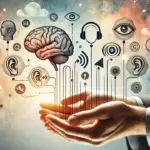Introduction
In today’s fast-paced world, the journey to understanding oneself can often take a backseat. Amidst the hustle and bustle, many of us forget to pause and reflect on who we truly are and what we desire. However, the importance of self-awareness cannot be overstated. It’s the foundation upon which we build our relationships, make decisions, and navigate life’s challenges. As someone who has delved deep into the realms of personal development, I’ve discovered a transformative approach to self-awareness: Neuro-Linguistic Programming (NLP). While many might have heard of NLP, few truly understand its profound impact on personal growth. In this blog, I aim to unveil the magic of NLP and how it can be a guiding light in your quest for self-awareness. Whether you’re a student, a professional, a therapist, or a housewife, the insights from NLP can be a game-changer in your journey to unveil your true self. So, let’s embark on this enlightening journey together and explore the wonders of NLP in the realm of self-awareness.
What is NLP?
Neuro-Linguistic Programming, commonly known as NLP, is a fascinating realm of personal development and communication. At its core, NLP examines the intricate relationship between our thoughts (neuro), language (linguistic), and behaviors (programming). It’s a bridge that connects our neurological processes, language patterns, and the external behaviors we exhibit.
Originating in the 1970s, NLP was the brainchild of Richard Bandler and John Grinder. They believed that excellence had a structure, and if that structure could be modeled, it could be replicated. Thus, NLP was born out of the desire to understand and replicate human excellence. It’s not just a therapeutic tool but a model of human communication and personal development.
Unlike traditional psychology, which often delves into the ‘why’ of behaviors and emotions, NLP is more focused on the ‘how.’ It’s about understanding how we do what we do, how we think, and how we communicate, both with ourselves and with others. By understanding these patterns, I’ve realized that we can change them, refine them, and even create new ones.
For those new to this concept, think of NLP as a user manual for the brain. It provides tools and techniques that allow us to harness the power of our mind, reshape our thoughts, and ultimately transform our lives. As we delve deeper into this blog, you’ll discover the profound impact NLP can have on self-awareness and personal growth.
To know more about NLP, read this post.
The Role of NLP in Self-Understanding
NLP offers a unique lens through which we can view ourselves. It goes beyond the surface, diving deep into our subconscious, unveiling patterns and beliefs that often operate behind the scenes. These patterns, formed over years of experiences and interactions, influence our perceptions, decisions, and reactions. By bringing them to light, NLP empowers us to understand the very essence of our being.
One of the foundational principles of NLP is that our language reflects our inner thoughts and worldviews. The words we choose, the stories we tell ourselves, and even our internal dialogues provide clues to our deeper beliefs and values. By analyzing these linguistic patterns, I’ve found that we can gain insights into our motivations, fears, and aspirations.
Furthermore, NLP emphasizes the role of sensory experiences in shaping our understanding. Our memories, both pleasant and painful, are stored with sensory details – sights, sounds, feelings. By revisiting and reframing these memories with NLP techniques, we can alter our emotional responses and perspectives.
In essence, the role of NLP in self-understanding is profound. It’s not just about introspection; it’s about transformation. Through NLP, we can rewrite our narratives, redefine our identities, and embark on a journey of genuine self-discovery.
NLP Techniques for Self-Awareness
NLP is rich with techniques and strategies designed to enhance self-awareness. These techniques serve as tools that can unlock the doors to our subconscious, revealing insights that might have remained hidden otherwise. Let me introduce you to some of the most impactful NLP techniques I’ve employed in my journey towards self-awareness:
1. Anchoring
- This technique involves associating a specific physical touch or gesture with a positive emotional state. For instance, pressing your thumb and forefinger together during moments of confidence can create an ‘anchor.’ Later, when you need a boost of confidence, replicating this gesture can evoke the same positive feelings.
2. Swish Pattern
- Often, we have behaviors or reactions we’d like to change. The Swish Pattern involves visualizing an unwanted behavior and then ‘swishing’ it with a desired behavior. Over time, this can help replace negative patterns with positive ones.
3. Visual/Kinesthetic Dissociation (VKD)
- This technique is particularly useful for dealing with traumatic memories. It involves viewing a distressing event as an observer, rather than a participant, which can reduce the emotional intensity of the memory.
4. Reframing
- At its core, reframing is about changing our perspective on a situation. By looking at events through a different lens, we can alter our emotional responses and interpretations.
5. Meta Model
- This linguistic tool helps delve deeper into vague statements or beliefs. By asking specific questions, the Meta Model challenges and expands limiting beliefs, paving the way for clarity and understanding.
6. Belief Change
- Our beliefs shape our reality. This technique involves identifying and challenging limiting beliefs, replacing them with empowering ones that align with our goals and values.
Each of these techniques offers a unique pathway to self-awareness. By practicing and integrating them into our daily lives, we can uncover layers of understanding about ourselves. NLP, with its vast array of techniques, provides a roadmap to self-discovery, guiding us towards a deeper connection with our true selves.
Enhancing Self-Awareness with NLP
Self-awareness is the cornerstone of personal growth. It’s the conscious knowledge of our character, feelings, desires, and motivations. While introspection and reflection are traditional routes to self-awareness, NLP offers a more structured and transformative approach.
NLP, at its core, is about understanding the language of our mind. It deciphers the codes and patterns that dictate our behaviors, reactions, and beliefs. By tapping into these patterns, I’ve realized that we can not only understand ourselves better but also make proactive changes to enhance our well-being.
One of the most enlightening aspects of NLP is its emphasis on the power of language. The words we use, both internally and externally, shape our reality. By becoming more mindful of our linguistic choices, we can start to identify and challenge negative self-talk, replacing it with more empowering narratives. This shift in language can lead to a profound shift in self-perception, allowing us to see ourselves in a more positive and compassionate light.
Moreover, NLP techniques like reframing and belief change enable us to view challenges as opportunities. Instead of getting bogged down by setbacks, we learn to see them as learning experiences, reshaping our mindset towards growth and resilience.
In essence, enhancing self-awareness with NLP is about harnessing the power of our mind. It’s about taking control of our narratives, understanding our motivations, and aligning our actions with our true selves. Through NLP, we embark on a journey of self-discovery, paving the way for a more fulfilled and authentic life.
Benefits of NLP in Personal Development
Personal development is a lifelong journey, one that involves continuous learning, growth, and self-improvement. Throughout my exploration of various personal development tools, NLP has emerged as a standout, offering a myriad of benefits that can profoundly impact one’s life. Here are some of the key benefits of integrating NLP into personal development:
1. Enhanced Communication
- NLP equips individuals with tools to understand and interpret verbal and non-verbal cues more effectively. This leads to improved interactions, fostering better relationships both personally and professionally.
2. Overcoming Limiting Beliefs
- We all carry certain beliefs that can hinder our progress. NLP techniques help identify and challenge these limiting beliefs, replacing them with more empowering and constructive ones.
3. Goal Setting and Achievement
- NLP provides a structured approach to setting clear, achievable goals. It aids in visualizing success and creating actionable steps to reach those aspirations.
4. Emotional Mastery
- Through techniques like anchoring and reframing, NLP empowers individuals to manage and regulate their emotions, leading to increased resilience and emotional intelligence.
5. Boosted Self-confidence
- By understanding and reshaping negative self-talk, NLP fosters a positive self-image, boosting confidence and self-esteem.
6. Personal Growth and Self-awareness
- NLP offers insights into one’s behaviors, motivations, and desires, promoting a deeper understanding of oneself and paving the way for genuine personal growth.
7. Adaptable Mindset
- NLP encourages flexibility in thinking, allowing individuals to adapt to changes and challenges with ease and grace.
Incorporating NLP into one’s personal development journey can be transformative. It offers a holistic approach, addressing both the conscious and subconscious aspects of the mind, leading to a more enriched, self-aware, and fulfilling life.
NLP Tools and Strategies for Personal Growth
The realm of NLP is vast, offering a treasure trove of tools and strategies designed to facilitate personal growth. These tools, when applied effectively, can catalyze profound transformations in one’s life. As someone who has delved deep into the world of NLP, I’d like to share some of the most impactful tools and strategies that have enriched my personal growth journey:
1. Rapport Building
- One of the foundational tools in NLP, rapport building is about establishing trust and understanding with others. By mirroring body language, tone, and speech patterns, we can create a sense of harmony and connection, enhancing our interpersonal relationships.
2. Submodalities
- These are the finer details of our internal representations, such as visual imagery, sounds, or feelings. By tweaking these submodalities, we can change the intensity of our experiences, turning negative memories into neutral or even positive ones.
3. Logical Levels of Change
- This tool helps in understanding the different levels at which change can occur, from environment and behavior to values, beliefs, and identity. It provides a structured approach to personal transformation.
4. Milton Model
- A linguistic tool that uses vague and ambiguous language to communicate with the subconscious mind. It’s particularly useful in therapeutic settings, helping individuals overcome deep-seated challenges.
5. Meta Programs
- These are habitual thinking patterns that influence our behaviors and decisions. By identifying our dominant meta programs, we can gain insights into our motivations and make more informed choices.
6. Time Line Therapy
- This strategy involves visualizing one’s life on a timeline, allowing individuals to revisit past experiences, heal old wounds, and visualize a brighter future.
7. Perceptual Positions
- A powerful tool for gaining multiple perspectives on a situation. By mentally stepping into another person’s shoes, we can develop empathy and better understand their viewpoint.
8. Collapsing Anchors
- A technique to neutralize negative emotional responses by associating them with positive experiences.
Incorporating these NLP tools and strategies into our daily lives can lead to profound personal growth. They offer a roadmap to self-discovery, helping us navigate challenges, understand ourselves better, and ultimately lead a more fulfilling and authentic life.
Real-life Testimonials
The transformative power of NLP is best understood through the experiences of those who have embraced its techniques. Here are a few real-life testimonials that highlight the profound impact NLP has had on individuals from various walks of life:
1. Sophia, a Therapist
- “Integrating NLP into my therapy sessions has been a game-changer. It has provided my clients with tools to overcome deep-seated traumas and reshape their narratives. The change I’ve witnessed in them is truly remarkable.”
2. Raj, a Businessman
- “NLP techniques have not only improved my communication skills but have also given me a competitive edge in negotiations. Understanding and adapting to the linguistic patterns of my counterparts has led to more successful deals.”
3. Aisha, a Housewife
- “After attending an NLP workshop, I’ve become more self-aware and confident. Techniques like reframing have helped me deal with daily challenges in a more positive manner, enriching my relationships with family and friends.”
4. Liam, a Student
- “NLP has been instrumental in improving my focus and academic performance. By visualizing success and setting clear goals, I’ve been able to achieve milestones I once thought were out of reach.”
5. Dr. Elena, a Physician
- “Incorporating NLP in patient interactions has enhanced my ability to understand their concerns better, leading to more empathetic and effective consultations.”
These testimonials underscore the versatility and efficacy of NLP, showcasing its potential to bring about positive change in diverse aspects of life.
Conclusion
The journey of personal growth and self-awareness is a deeply individual and transformative one. NLP, with its myriad of tools and techniques, offers a structured and insightful path to navigate this journey. From enhancing communication and reshaping limiting beliefs to fostering emotional mastery and self-confidence, NLP has proven to be a beacon of light for many, including myself. As we’ve explored through real-life testimonials, its impact is profound and far-reaching, touching the lives of individuals from various backgrounds and professions. In essence, NLP is more than just a set of techniques; it’s a philosophy, a way of understanding oneself and the world around us. As we conclude this exploration, I invite you to embrace the wonders of NLP, embark on your journey of self-discovery, and unlock the infinite potential that lies within.
Additional Resources and Next Steps
Diving into the world of NLP is an enriching experience, and the journey has only just begun. For those eager to delve deeper and continue their exploration, here are some additional resources and recommended next steps:
1. Books
- Titles such as “The Structure of Magic” by Richard Bandler and John Grinder, and “NLP: The Essential Guide” by Tom Hoobyar offer comprehensive insights into NLP’s foundational concepts.
2. Workshops and Courses
- Many institutions and online platforms offer NLP certification courses, ranging from beginner to master practitioner levels. These courses provide hands-on experience and in-depth knowledge.
3. NLP Practitioners
- Consider booking a session with a certified NLP practitioner. Personalized sessions can offer tailored insights and techniques specific to your needs.
4. Online Forums
- Platforms like NLP Connections and Neuro-Linguistic Programming Forum are vibrant communities where enthusiasts share experiences, ask questions, and discuss advanced techniques.
5. Practice
- The essence of NLP lies in its application. Regularly practicing the techniques, reflecting on experiences, and seeking feedback can enhance your understanding and mastery.
In conclusion, the path to mastering NLP is a continuous journey of learning and self-discovery. With the right resources and a curious mindset, the transformative power of NLP awaits. Embrace the journey, and let the adventure unfold.










